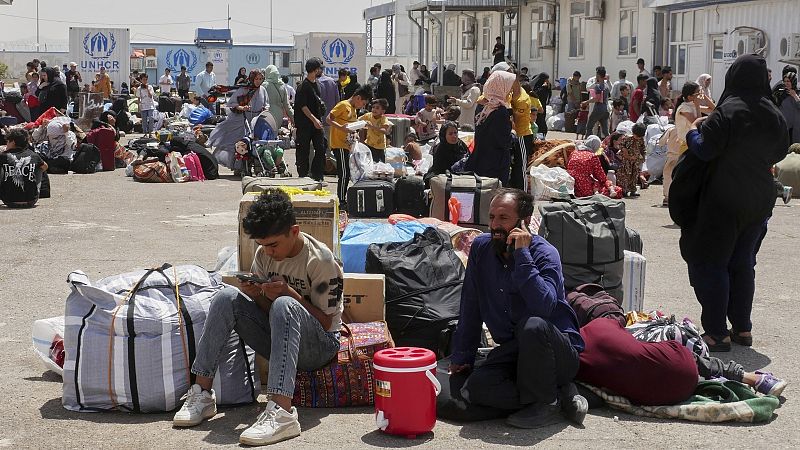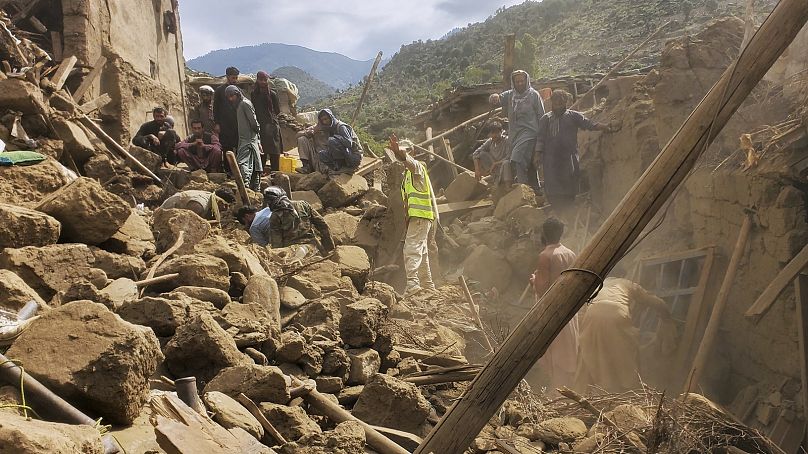Afghanistan faces 'triple' returnee, climate and aid cut crisis, IOM mission chief says

Sweeping cuts to foreign aid are impacting the UN's ability to support hundreds of thousands of vulnerable Afghans returning to their country, with the humanitarian response also overstretched following a series of deadly earthquakes, the International Organization for Migration (IOM) chief of mission for Afghanistan has told Euronews.
Around 2 million Afghan nationals have returned from neighbouring Iran and Pakistan this year alone, the majority from Iran, with as many as 40,000 crossing the border every day at the peak of the crisis in July.
While some returnees go back voluntarily, many are forcibly expelled.
Pakistan has recently accelerated deportations under the so-called Illegal Foreigners' Repatriation Plan, with a recent target for Afghan nationals holding UNHCR Proof of Registration (PoR) cards to leave the country by 1 September.
There has also been a recent mass of Afghans, including refugees, forcibly returned from Iran, with a surge in deportations in the wake of the twelve-day war between Iran and Israel.
Tehran has cited national security concerns and made widespread accusations linking Afghans in Iran to Israel’s intelligence services to justify its crackdown.
Many returnees arrive destitute and in desperate need of shelter, economic assistance, and help to rebuild their lives.
“They're coming back to a kind of new country. They don't understand how to navigate the system, or what the conditions are like,” Mihyung Park, the IOM’s chief of mission for Afghanistan, said.
“A lot of these people are undocumented and even with documentation at the border, they're often confiscated.”
Park explains that returnees have a raft of basic needs, including cash, shelter and access to economic opportunities.
“A lot of people actually do want to stay. They want to settle in the country and see how they can cope,” she says. “But after a while, what they face is lack of livelihood opportunities and they don't have homes.”
Aid cuts mean majority of returnees cannot be assisted
Western governments’ broad cuts to humanitarian and development aid, most notably US President Donald Trump’s decision to freeze his administration’s foreign aid in February, are denting aid operations across the world, with the impact particularly felt in Afghanistan.
An estimated $1.7 billion (€1.5 billion) in US aid to Afghanistan has been stripped away this year, forcing an estimated 50 international aid organisations or agencies to partly or wholly suspend operations.
The UN has previously warned that cutting the funding could be a ‘death sentence’ for millions of people.
“It has really impacted our work – not just IOM, but all humanitarian agencies operating in the country – in quite a serious way,” Park told Euronews.
“We had to make quite difficult decisions to de-prioritise (...) and this is even before the earthquake and the large returns that we did not foresee from both Iran and Pakistan.”
The agency has established nine ”vulnerability criteria” to direct funding to those most in need, while also recognising that the majority of returning individuals are vulnerable and require assistance.
“When, in 2023, we had about a million people who returned from Pakistan, we were able to assist almost everyone with immediate assistance. Now, we can barely assist 20% to 30% of people who meet the vulnerability criteria,” she added.
A series of recent earthquakes and consequent aftershocks that hit Afghanistan’s mountainous eastern border region, killing more than 2,200 people, have also compounded urgent needs, with the UN recently warning that some affected areas have not yet been reached.
The UN has issued an emergency appeal for nearly $140 million (€119 million) in funding to help almost half a million people affected.
“We had to really squeeze before the earthquake (...) Now we have to squeeze again to provide assistance to the earthquake-affected zone. So we really, every day, we try to, we struggle to see how we can de-prioritise our priorities,” Park explained.
“Of course, that means the people who really need support will not be getting support.”
Women returning face huge barriers
The UN is also warning that women returnees face rising risks, as Taliban restrictions on women's and girls’ rights intensify.
“These are big, huge challenges they face, especially for women, and especially women returning from Iran: they're quite educated and they're exposed to a more open society where they used to go to school, had jobs, and had a good university background," Park said.
"So when they return, they are anxious and uncertain about adapting to an Afghan society where you have no freedom for work, and education is a huge challenge.”
The IOM estimates that women make up just under one-third of returnees from Iran so far in 2025, and about half of all returnees from Pakistan.
On Thursday, the UN’s refugee agency said it was halting its assistance to returning Afghans after the Taliban prevented its Afghan female staff from working.
In a statement, the UN said that "de facto Afghan security forces prevented national female staff members and contractors of the United Nations from entering UN compounds in Kabul," adding that security officers were "visibly present" outside UN premises in Kabul, Herat and Mazar-i-Sharif.
The IOM said that while it had also been impacted, it maintained its "commitment to a principled response in the country", ensuring it continued to "support vulnerable Afghan women, men, boys and girls with humanitarian and resilience programming, delivered through (...) female and male personnel throughout the country."
Today


